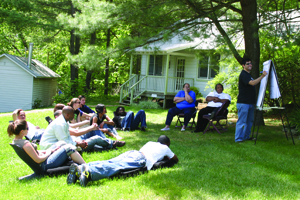Standards of accountability for mobile giving might pave the way for an eventual merger between the Better Business Bureau’s Wise Giving Alliance and the Mobile Giving Foundation but also open the mobile channel to smaller charities, bigger donations and monthly, sustaining gifts.
The BBB Wise Giving Alliance (WGA) and the Mobile Giving Foundation (MGF) announced on Monday a joint venture that will adapt the WGA’s standards of accountability to MGF’s mobile charity partners.
Mobile is quickly becoming a critical tool for charities, especially during disasters, said Carrie Hurt, CEO of the Council of Better Business Bureaus (BBB). Almost a year ago, she said MGF founder Jim Manis presented the idea to co-brand the two entities and the discussions began immediately.
Mobile giving in the United States last year was slightly more than $10 million, with MGF processing more than half of that amount, Manis said. In 2010, mobile giving was $43 million, sparked by the response to the Haiti earthquake, and MGF paid out about 80 percent of that year’s total.
The partnership takes effect immediately. During the next 18 to 24 months Alliance staff will work with MGF to evaluate its clients and to help those that are not yet in compliance with the alliance’s standards. National charities will be evaluated by the alliance and local charities will be evaluated by one of the 106 local BBBs across the United States.
New charities will also be able to participate in the BBB Mobile Giving Alliance by following the acceptance procedures for both organizations. Charities currently meeting all WGA standards will be eligible for the MGF platform immediately.
The Wise Giving Alliance and local BBBs examine charities based on 20 giving standards and have issued reports on more than 10,000 charities. Organizations that meet these standards will qualify to receive a text short-code, enabling them to transact donations via the BBB Mobile Giving Foundation.
If nothing else, this will open a donating channel for a younger demographic, said Art Taylor, president of the Wise Giving Alliance. “That first gift can stimulate future gifts, or if not done well, it may turn them off for a lifetime. We want to make sure that first gift is a great experience,” he said.
The partnership also will open up the possibility of expanding text giving options to monthly sustaining gifts and larger gifts of $40 or $50. “This would dramatically increase the return on investment for charities and make text giving available to constituents,” Taylor said. Approximately 54 percent of the organizations that are evaluated meet all 20 standards, he said.
Taylor described the partnership as a “joint venture” in which the MGF will be known as the BBB Mobile Giving Foundation. In the months ahead, Taylor said the hope will be that the MGF remains a stand-alone entity controlled by the BBB.
MGF receives revenue from charities through an application fee of $350, from the charities’ marketing companies for access to the reporting platform, and from corporate and foundation grants. MGF will reimburse BBB for the cost of doing the additional evaluations needed to assure that all the foundation’s charities meet WGA standards of accountability. The foundation strives to keep overhead costs of less than 10 percent, describing overhead rates as low as 6 to 7 percent for “active, effective” campaigns.
Mobile technology enables an impulse response by a large consumer base, particularly during disasters, which Manis said further enables an obligation to provide the highest degree of standards of accountability. All charities that use that channel meet the same standards but one bad actor diminishes the value for all, he said, which makes setting standards of accountability the right thing to do.
“The motivation to build value for charities and to sustain value over a long period of time as mobile continues its growth, changes and tracks consumer behavior, from text to mobile web — that led us to this mobile partnership,” Manis said.
The foundation’s standards previously had excluded charities with less than $500,000 of revenue the previous year, which Manis said prevented some high-quality small nonprofits from joining the mobile channel.
“Often times, users of technology tend to take a back seat to owners of technology,” Manis said. “It really gives charities a greater voice in controlling technology that they’re using for both donor acquisition, fundraising and donor engagement,” he said.
Today, there is a limit of $5 and $10 for a mobile gift but the foundation has experimented with $20 and $25 gifts. “The issue is not price points but return on investment, and this arrangement will allow us to directly address that question and continue to experiment,” Manis said.











